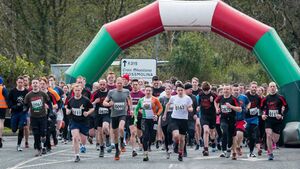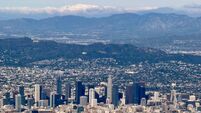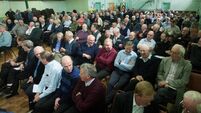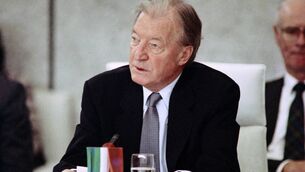We need to start recognising real communities

Participants in the Mayo Mud Run in Moygownagh in 2019. Picture: James Wright Photography
As an Irish emigrant in America, I often find myself comparing the two societies. For years, Ireland looked west for inspiration on diversity and progress. The 'Land of the Free' was the ultimate model we all compared ourselves to. Yet, it’s Ireland that now is considered the more liberal beacon. Abortion, once a bitter national row, is now written into Irish law. In the United States, Roe v. Wade has been overturned. Marriage equality? Ireland voted it into the constitution. In America, it’s still vulnerable to court challenges - and don’t get me (or my wife!) started on employment law or health care.
So recently, I was pontificating on these contrasts with a wine-infused confidence in a crowded ‘Tony's Darts Away’ bar in Burbank when I mentioned “the LGBTQ++ community”, in what I thought was a friendly gesture, referred to it as “your community” to a dapper-dressed lawyer seated across from me.
With a yelp, he halted me with a dead-eyed gaze.
“First,” he said, “it’s now called LGBTQIA+, they’ve added Intersex, and Asexual. Second, you’ve assumed I identify with it and third - and the most important part - it’s all a bunch of crap... okay?”
As the gang-plank was being pulled in from under me, I desperately groped for some rescue in misplaced humour - “but you’re so well dressed for a... for... I mean... him or she?”
Mercifully, I was cut short again.
“No! you dumbass... I mean we’re not a community! We don’t have weekly meet ups, share make-up tips and or swap tea!”
While recovering my dignity, I was educated in ‘tea’ and how lumping together different people under one banner isn’t community - it’s political shorthand. At best it’s lazy. At worst it deepens division by telling people what box they belong in, or don’t and whether they agree or not -though he/she did like my fashion-sense compliment of him/her. So, I did the only face-saving thing I could and bought my antagonist a pint.
They/them had a point (and a pint). The word community has become one of the most over-used terms in public life. Politicians, media and pundits love it. Stick 'community' in front of 'policing' or 'housing' and suddenly a cold, bureaucratic phrase sounds warm and inclusive. Influencers on social media speak about 'their community' when what they really mean is their followers in what was once known as 'a group'.
But is a crowd of football fans in a stadium a community? Or a bunch of strangers in a Facebook forum? Not really. They might become one, but they don’t start as one.
This is where Professor Toby Lowe comes in. Lowe, a political theorist from Newcastle, spent his PhD in the 1990s trying to nail down what we actually mean by community. In 2021, he revisited that work and offered a definition that cuts through the fog. For him, a community is a group of people who collectively share an identity-forming story.
This is not geography, not demographics, not just a hobby in common, but a shared narrative that people develop with each other and make part of their own lives. Communities provide characters, histories and archetypes that members absorb into their own sense of self. I fully agree with his argument.
When we say 'story', we don’t mean a fairytale. We mean the real, lived narratives that people carry inside themselves. Lowe points out that community members weave its history into their own personal history. They see the world through the lens of these shared understandings - as the stories of community become the stories of self.
That is why sharing responsibilities, rewards and results in communities matters so much; it forges the shared narrative of inclusion. People gain not only belonging but also a framework for how they understand the world and themselves. Strong, healthy communities give us stories that nurture resilience and solidarity. Weak or toxic ones distort those stories and by extension distort how we see ourselves and others.
Lowe argues that any serious definition of community must tick six boxes:
1. It must cover different forms. Communities of place (a parish, a county) and communities of interest (academics, GAA clubs, Irish Nationalists or Loyalists).
2. It must recognise the good and the bad. Communities give us belonging, but they can also be destructive. The Mafia is a textbook community though hardly ‘good’.
3. It must explain belonging. Why we feel proud or wounded when 'our' community is praised or attacked.
4. It must show the moral weight. Communities shape how we decide who’s a good neighbour or a bad one.
5. It must separate community from 'group'. A bus queue is not a community. Nor is an Instagram fan club.
6. It must allow for overlap. People belong to multiple communities at once, often explaining the tensions people experience between them.
By those criteria, my bar colleague was right. There is no monolithic 'LGBTQIA+ community'. There are people with wildly different lives and stories. Bundling all non-green-eyed, dyslexic celibates into a 'community' makes almost as much sense.
By contrast, I’ve seen what real community looks like in Los Angeles whose members simply share a love of Ireland. Since Covid, the Irish here have built a vibrant WhatsApp support group with occasional meet-ups that has gradually become something much more important. When wildfires tore through the Palisades, leaving Irish families without homes or hope, the group mobilised instantly with offers of financial help, accommodation and services, with willing hands and open hearts.
This is becoming a community in the true sense: bound by a story of Irishness, of migration and solidarity, not just by circumstance. They may rarely meet in person, but see themselves through the same lens. That’s more than a chat thread. It’s an identity.
Back home in my rural Moygownagh, community was more obvious. It was the parish. It was Mass on Sunday. It was the GAA. It was the only village shop and pub. It was also a truth we often forget: communities are not made up of people who all get along.
Quite the opposite. Many locals even disliked each other, but still worked side by side in the annual ‘Mayo Mud Run’, or built a GAA stadium and community centre, or fielded football teams. Community wasn’t optional. You all pulled together whether you liked it or not. You joined a meitheal to help a neighbour. You did it for 'the parish'.
Northern Ireland shows the same pattern in wider relief. The 'nationalist community' included both those who backed the IRA’s armed struggle and those who followed John Hume’s peaceful constitutional path. They deeply disagreed on many things except their core story - nationalism. This shared story made them one community.
Why does all this matter? Lowe says it’s because social change is, at its heart, narrative change. Communities are the places where our most important stories are told, rehearsed and contested. I believe it also involves autonomy - the state must recognise that these intrinsic units of our society and empower them in deciding their own futures, making real decisions locally - even if they get them sometimes wrong.
If you want to make a street safer, you have to change the story of what it means to live on that street. If you want to achieve gender equality, you have to change the stories about men and women within each community. Grand human rights language only becomes real when it is translated into the everyday narratives people live by.
That’s why healthy communities matter so much. They don’t just offer companionship. They build the stories that people internalise as their own. They shape how we see the world and how we see ourselves. In short: the story of the community becomes the story of the individual and how to work together for the common good.
My Dapper-Dan lawyer was right to challenge me. There is no single LGBTQ-or-whatever community. There are only communities - plural - each with its own story. They are not hashtags or YouTube followers or focus groups for political speeches. They’re the messy, demanding, identity-forming stories that bind us together in parishes, in diaspora WhatsApp groups, in towns and villages, even in countries.
They don’t always make us comfortable. Sometimes they force us to sit beside people we’d rather avoid - or, as I discovered in that bar, to swallow the uncomfortable truth that we’ve lazily slapped the word 'community' on something that isn’t one at all.
If we want to change our overly-individualistic society, we need to change our stories. And if we want to change our stories, we need to stop talking a bunch of crap about 'the community' and start recognising real ones - the ones that actually hold us, shape us and occasionally make us buy a pint for someone we mightn’t even (initially) like.





